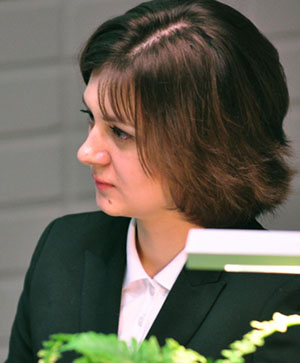Virtual campus for Biomedical Engineering
|
In her dissertation Asta Kybartaite has developed a virtual campus for Biomedical Engineering (BME). She works as researcher at the department of Biomedical Engineering at Tampere University of Technology.
The work originated with the European Virtual Campus for Biomedical Engineering (EVICAB) project, which ran from January, 2006 to December, 2007. The aim of the project was to develop, build up and evaluate a sustainable, dynamic solution for virtual mobility and e-learning in the field of BME. The ideas and experience gained from the project were disseminated in international conferences and raised considerable interest in the future possibilities and applications of e-learning. This led to the extension of the study after the initial project was over, concentrating on the topic “Impact of Modern Educational Technologies on Learning Outcomes: Application for e-Learning in Biomedical Engineering”. |
 MSc Asta Kybartaite’s dissertation Impact of Modern Educational Technologies on Learning Outcomes: Application for e-Learning in Biomedical Engineering was publicly examined at the TUT, Faculty of Science and Environmental Engineering in June. |
|
The purpose of this further study was first, to make a theoretical evaluation of technology-enhanced education (theoretical approach), next, to develop a portal for e-learning (practical approach), then, to experimentally study how students accept e-learning (evaluative approach), and finally to define future feasible developments in the field (developmental approach).
Biomedical Engineering (BME) is multidisciplinary and is one of the fastest growing fields in science having significant impact on human health and well-being. It is a discipline that advances knowledge in engineering, biology and medicine, and improves human health through cross-disciplinary activities that integrate the engineering sciences with biomedical sciences and clinical practice. The broad nature of BME offers a number of challenges to all participants in its educational process, i.e., for the students, who are encouraged to apply classical engineering concepts in profoundly new ways, relating them to living elements. Such students pursue university degrees or just in time information, are international, visiting or exchange students, ne(x)t generation students who mainly study outside the classroom, having work or family commitments, or who, due to health problems or disabilities, are not able to attend classroom lectures. Furthermore, educators and faculties are compelled to keep up with all the advances in the related fields, to develop new learning curricula, environments and reasoning strategies anticipating the needs of prospective employers of graduates. And, employers of graduates demand a wide range of capabilities. MSc Asta Kybartaite’s dissertation Impact of Modern Educational Technologies on Learning Outcomes: Application for e-Learning in Biomedical Engineering was publicly examined at the Tampere University of Technology (TUT), Faculty of Science and Environmental Engineering on the 11th of June 2010.
Further information: Asta Kybartaite, |
|
![]()

 Curriculum page
Curriculum page Top of page
Top of page